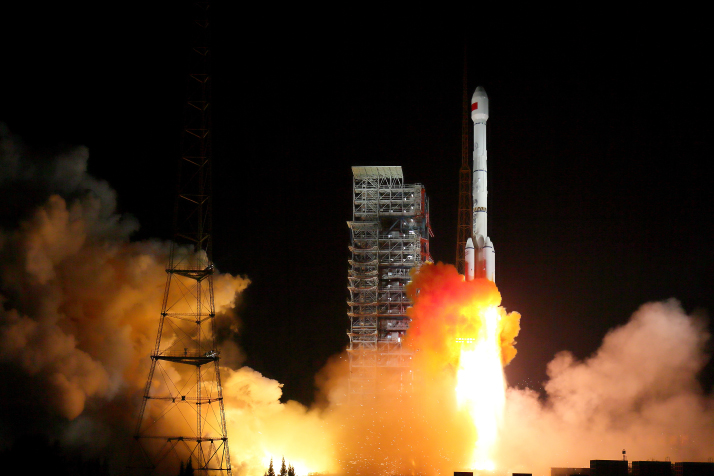|
||||||
|
||||||
| Home Nation World Business Opinion Lifestyle ChinAfrica Multimedia Columnists Documents Special Reports |
|
||||||
|
||||||
| Home Nation World Business Opinion Lifestyle ChinAfrica Multimedia Columnists Documents Special Reports |
| Nation |
| Location, Location, Location |
| Homegrown navigation system is improving and going global |
| By Yuan Yuan | NO. 49 DECEMBER 7, 2017 |
 The model of BeiDou Navigation Satellite System is on display at the 20th China Beijing International Hi-Tech Expo on June 9 (XINHUA)
For smartphone users, finding a nearby restaurant, grabbing a taxi blocks away, and getting directions to a destination are all habitual processes, yet it is a satellite navigation system, by providing location positioning services, that makes all this happen. Until now, the technology has been dominated by the U.S government-owned Global Positioning System (GPS), but China's domestic navigation satellite system BeiDou is now catching up. On November 6, two BeiDou-3 satellites were launched aboard a Long March-3B carrier rocket from the Xichang Satellite Launch Center in Sichuan Province, marking China's first step in upgrading its BeiDou Navigation Satellite System to have global coverage capabilities. The third generation Named after the Chinese term for the Big Dipper constellation, the BeiDou project was formally initiated in 1994 by the China National Space Administration, with operations getting underway six years later in 2000 after the first satellite was launched that year. BeiDou's first generation, consisting of four satellites launched from October to December 2000, is restricted for military use and serves only China. It can locate ground-based users to an accuracy of 20 meters and is different from other navigation systems in that it can also send text messages of locations. The second generation of BeiDou, composed of 16 satellites, started its service in 2007, covering the whole Asia-Pacific region. The system's accuracy was improved to 10 meters, and the messaging function proved crucial in the rescue work during the aftermath of the earthquake that hit Sichuan on May 12, 2008. The development of the third generation of BeiDou, aiming this time for greater accuracy and stability, began in 2009. Scientists used five BeiDou satellites launched in 2015 and 2016 to verify the technology for the third-generation models. "Thanks to improvements in inter-satellite links, laser communication devices and atomic clocks, the new generation features better accuracy, stability and signal clarity," Yang Changfeng, chief designer of the BeiDou system, said to Xinhua News Agency. The atomic clocks installed in the two newly launched satellites are more reliable than those in previous satellites. "Their stability was as high as E-14, which means just one second of deviation in 3 million years," Yang said. Steady advances in technology have helped to improve the accuracy of the system's navigation and location-detection functions. China announced earlier this year that, with the help of a new chip, BeiDou satellites can locate ground-based users to within 1 or 2 meters. With this level of precision, BeiDou is only just behind the European Union's Galileo Navigation Satellite System, which offers consumers a level of accuracy to within just 1 meter. In comparison, GPS accuracy is correct to within 5 meters, while Russia's GLONASS Navigation Satellite System claims to be accurate to within 4.5-7.4 meters. Li Xueli, an engineer working with BeiDou, revealed two major improvements for users. "One is the time the system takes to process your journey can be shortened from 30 to just 3 seconds," Li said. "The second improvement is in position accuracy. The system can now tell if the car is on a main road or a side road." "The stability of the new-generation atomic clocks has been improved tenfold compared with those carried by BeiDou-2 satellites," said Qu Yongsheng from the No.5 Research Institute of China Aerospace Science and Technology Corp., the developer of the clocks. They will also have better compatibility with GPS, GLONASS and Galileo, and operate for at least 12 years in space. Xie Jun, chief engineer of BeiDou-3 satellites at the China Academy of Space Technology, revealed that each of the newest satellites is able to operate independently for at least 60 consecutive days in the event of a malfunction in ground control. This enables the network to reduce dependence on ground stations and, in doing so, reduce operational costs. So far, 29 satellites have been launched for the BeiDou network, providing positioning, navigation, timing and messaging services to civilian users in China and parts of the Asia-Pacific region since December 2012. By 2020, BeiDou is set to become a global positioning and navigation system.  Two third-generation Beidou satellites are lifted atop a Long March 3B carrier rocket from the Xichang Satellite Launch Center in Sichuan province on November 6 (XINHUA)
Civic application On October 14, an ARJ21-700 plane equipped with BeiDou navigation services successfully landed at an airport in Dongying, east China's Shandong Province, marking the first time a domestically produced regional jet has successfully flown with the BeiDou technology. The flight was able to test the performance of the onboard navigation information receiver, the ground-based signal enhancement system, and the messaging function of the BeiDou system. BeiDou's commercial application started in 2012, and within just four years of development the commercial model has become a widespread feature of China-made smartphones and automobiles, helping users to navigate busy traffic. According to a whitepaper released in November 2016 on BeiDou's application on mobile intelligent terminals, as of August 2016, 759 smartphone models supported BeiDou services, accounting for 21 percent of all available phone models. In the same year, approximately 510 million satellite navigation enabled devices were sold in China, among which more than 30 percent were set up with BeiDou services, reflecting the enormous potential of the market. Mobike and Ofo, two major bike-sharing companies in China, use smart locks enabled by BeiDou. On a meeting on July 31, China's 15 major motorcycle producers reached consensus on preloading their motorcycles with BeiDou services by 2018. Beijing Enterprises Group Co. Ltd., a major infrastructure builder, said in June that the company will use BeiDou to help accelerate the development of Tongzhou District, an area designed to be the subsidiary administrative center of the capital. "BeiDou, for instance, will be utilized to help track construction vehicles and locate building sites," said Hou Zibo, General Manager of the group. By using BeiDou to track gas pipelines, Beijing Gas, a unit of Beijing Enterprises, has managed to swiftly locate gas leaks before serious damage is caused. "BeiDou can be used in a much wider area than many people imagine," said Ran Chengqi, Director of China Satellite Navigation Office. He revealed that in 2016, the output of China's navigation system and satellite location-based service market reached 211.8 billion yuan ($32.6 billion). By 2020, the scale of China's satellite navigation business will surpass 400 billion yuan ($58 billion). As the world's fourth navigation satellite system, BeiDou now covers nearly 30 countries involved in the Belt and Road Initiative, such as Pakistan, Egypt and Indonesia. By 2020, with more than 30 satellites operating in its network, BeiDou's global coverage will expand even further. In November 2014, the BeiDou system gained recognition from the International Maritime Organization. On November 23, the Ministry of Transport announced that BeiDou has been included in the International Cospas-Sarsat Programme, a 44-member, nonprofit, intergovernmental and humanitarian cooperative to collect and distribute data for search and rescue missions. "As BeiDou expands its overseas reach, it will be increasingly popular in the logistics industry," said Miao Qianjun, Secretary General of China Technical Application Association for Global Positioning System. "The market for BeiDou is very promising. I believe, like the high-speed railway products and technologies, BeiDou will soon become another name card for China." Copyedited by Laurence Coulton Comments to yuanyuan@bjreview.com |
About Us | Contact Us | Advertise with Us | Subscribe
|
||
| Copyright Beijing Review All rights reserved 京ICP备08005356号 京公网安备110102005860号 |